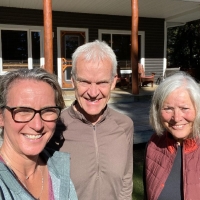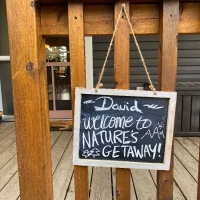In the classic 1969 Henry Hathaway movie,True Grit, John Wayne plays a drunken, hard-nosed U.S. Marshal who helps a stubborn teenager track down her father’s murderer. In true John Wayne fashion, he demonstrates a most valued virtue: grit. It’s a short word with great power. Grit is tenacity, perseverance, stamina, sticking with the task at hand day in and day out, not just for the day or the month or the years, but for as long as it takes. Grit is about passion and purpose and persistence. Grit is about living life as a marathon, not a sprint or a walk in the park. According to the Merriam-Webster dictionary, grit is defined as “firmness of character… an indomitable spirit.” Those with grit know that everything will be alright in the end, and if it’s not alright, it is not yet the end.
It’s easy to start, but it takes grit to finish. While authenticity in leadership is learning to connect, to be vulnerable and open and humble, it doesn’t mean that you don’t have a spine. Leadership without backbone, without grit, isn’t leadership at all. Leadership means, at times, the toughness to stand for something, the toughness to finish, and the toughness to refine our soul with the sandpaper of hardship.
When my grandfather worked three jobs raising eight kids during the depression, he modeled grit. When I watch my friends, colleagues, and clients here in Alberta display courage, innovation, and tenacity to get through today’s challenging economic times, I see grit. When someone sets aside personal gain to be beside an ill loved one through a long illness, I am reminded of the value of this precious virtue. Grit means seeing the task through, not because it’s easy or comfortable or self-serving, but because it is the right thing to do.
Here are three qualities that both demonstrate – and inspire – grit:
A COMPELLING VISION
Dr. Martin Luther King Jr.’s unwavering persistence in fighting for civil rights, justice, anti-discrimination, and peace inspired a broken nation. An athlete training for the Olympics will persevere through the pain of getting up early, endure the hours of brutal workouts, and see it all the way to the end. Why? Because of the power of the dream. Thomas Edison allegedly tried 10,000 times before succeeding in his light bulb. A gritty undergraduate college student will study long into the night, night after night, with the vision of becoming a doctor. A young entrepreneur endures the challenges and setbacks of failures to find a way to bring her vision to the marketplace. A recovering alcoholic, with a vision of self-respect and a commitment to the wellbeing of his family he loves, will muster the grit to stay with he program. It’s a captivating vision, along with a profound and sustaining commitment to that vision, that inspires and awakens the human spirit.
COURAGE
Theodore Roosevelt, a true exemplar of grit, spoke of overcoming fear by embracing it with vulnerability and courage in an address at the Sorbonne in 1910.
It is not the critic who counts; not the man who points out how the strong man stumbles, or where the doer of deeds could have done them better. The credit belongs to the man who is actually in the arena, whose face is marred by dust and sweat and blood; who strives valiantly; who errs, who comes short again and again, because there is no effort without error and shortcoming; but who does actually strive to do the deeds; who knows great enthusiasms, the great devotions; who spends himself in a worthy cause; who at the best knows in the end the triumph of high achievement, and who at the worst, if he fails, at least fails while daring greatly…
It takes courage to dream, and even greater courage to persist in the realization of that dream. It takes courage to identify the habits that will create and realize your dream, and even greater courage to get up early and implement those habits and ignore a thousand possible excuses to stay in bed. It takes courage to keep making progress, to keep setting new standards, in the midst of the world telling you to settle for conformity and mediocrity.
Courage, however, isn’t always apparent. You can’t always see courage, nor can courage be accurately assessed by anyone else. It takes courage to finish a marathon, and sometimes it takes courage to stop. It takes courage to build a business, and it takes courage to find other priorities in your life. It takes courage to do a job right, and it takes courage to let go of perfection, and instead allow excellence to be your standard. It takes courage to get back on the proverbial horse, and sometimes it takes courage to walk away from the horse. It takes courage to stay in a relationship, and sometimes it takes courage to leave a relationship. It takes courage to love, and it takes courage to let go. Courage, a quality vital to grit, is developed with practice and identified by a well-tuned conscience.
CARING
Jeff Clark, President of Kitchen Partners Ltd. in Edmonton believes, “there are two kinds of people in the world: ‘me’ people and ‘we’ people.” My conversation with him got me thinking that ‘me’ people turn grit into greed. Without the ‘we,’ without humanity and a dedication to the greater good, grit turns into obsession and narcissism. Grit without caring isn’t grit at all. Grit without compassion is bullying and tyranny.
Grit combined with caring is character. As I write in my book, Caring is Everything, caring enriches every facet of our lives. Grit is caring enough about someone or something to persevere. Grit is caring so much that you’ll do whatever it takes. If you care enough, you will find the grit. If you can’t find it in you to dream, maybe all you need to inspire grit is to care.
Grit, like other qualities of character, cannot be “taught” to others like you teach algebra or organic chemistry. Grit, however, can be “caught.” It can be discovered. It can be fostered in the cultures where we work and live if we take the advice of Albert Schweitzer, the theologian, philosopher, and physician:
“Example is not the main thing in influencing others, it is the only thing”.
|





